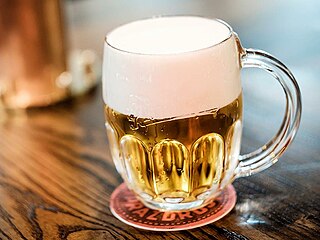
Pilsner is a type of pale lager. It takes its name from the Bohemian city of Plzeň, where the world's first pale lager was produced in 1842 by Pilsner Urquell Brewery.

Mead, also called honey wine, and hydromel, is an alcoholic beverage made by fermenting honey mixed with water, and sometimes with added ingredients such as fruits, spices, grains, or hops. The alcoholic content ranges from about 3.5% ABV to more than 20%. Possibly the most ancient alcoholic drink, the defining characteristic of mead is that the majority of the beverage's fermentable sugar is derived from honey. It may be still, carbonated, or naturally sparkling, and despite a common misconception that mead is exclusively sweet, it can also be dry or semi-sweet.

Little Creatures is a brewery based in Fremantle, Western Australia, operating as a subsidiary of the Japanese firm Kirin Company. It is owned by Little World Beverages, a wholly owned subsidiary of Lion which is itself a wholly owned subsidiary of Kirin.
Des de Moor is a writer, singer, musician and songwriter. In 1987 he formed The Irresistible Force with Morris Gould aka Mixmaster Morris.

Dogfish Head Brewery is a brewing company based in Milton, Delaware founded by Sam and Mariah Calagione and, as of 2019, owned by the Boston Beer Company. It opened in 1995 and produces 262,000 barrels of beer annually.

Beer in Belgium includes pale ales, lambics, Flemish red ales, sour brown ales, strong ales and stouts. In 2018, there were 304 breweries in Belgium, including international companies, such as AB InBev, and traditional breweries, such as Trappist monasteries. On average, Belgians drink 68 litres of beer each year, down from around 200 each year in 1900. Most beers are bought or served in bottles, rather than cans, and almost every beer has its own branded, sometimes uniquely shaped, glass. In 2016, UNESCO inscribed Belgian beer culture on their list of the intangible cultural heritage of humanity.

Beer has been brewed in England for thousands of years. As a beer brewing country, it is known for top fermented cask beer which finishes maturing in the cellar of the pub rather than at the brewery and is served with only natural carbonation.

In brewing, adjuncts are unmalted grains or grain products used in brewing beer which supplement the main mash ingredient. This is often done with the intention of cutting costs, but sometimes also to create an additional feature, such as better foam retention, flavours or nutritional value or additives. Both solid and liquid adjuncts are commonly used.
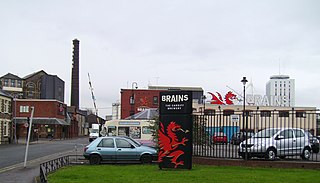
Beer in Wales can be traced to the 6th century. Since the 2000s, there has been a growing microbrewery industry in Wales.
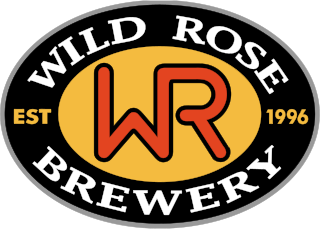
Wild Rose Brewery, established in 1996 as an independent craft brewery in Calgary, Alberta, Canada, is now a part of Sapporo Breweries of Japan.
Dupont Brewery is a brewery in Tourpes (Leuze-en-Hainaut), in western Hainaut, Belgium. Founded in 1950, it is on a working farm which dates back to 1759 and has significant brewing history. In the 1990s, a bread bakery and cheese-making facility were added.
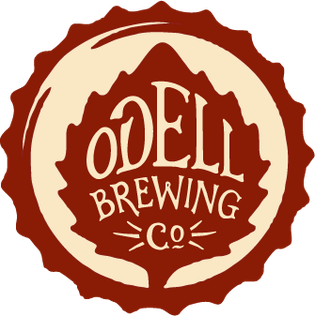
Odell Brewing Company is an independent craft brewery in Fort Collins, Colorado. It's the 23rd largest U.S. craft brewing company by the Brewers Association. Odell Brewing is known for their hop-forward and balanced IPAs.
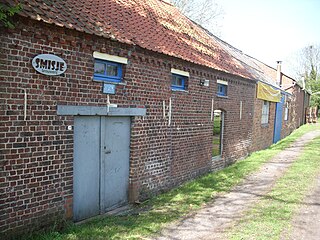
The Smisje Brewery, with a tiny production of only 200 hectoliters per year, is one of the smallest existing Belgian craft breweries. Begun in 1995 by former printer and homebrewer Johan Brandt, it was originally titled "De Regenboog", the same name as his earlier printing business. Brandt is also a bee-keeper, which accounts for the prominent use of honey in some of the brewery's offerings, including its first commercial beer, which was named 't Smisje or "the little blacksmith" to reflect the hand-crafted nature of the product as well as a local landmark blacksmith's house near the brewery's original location.
Desnoes and Geddes Limited (D&G) is a Jamaican brewer and beverage producer, best known for Red Stripe lager. It was formed in 1918 by Eugene Peter Desnoes and Thomas Hargreaves Geddes who combined their two shops into one business, originally producing soft drinks and distributing imported alcohol, and later opening the Surrey Brewery in Kingston.

Half Pints Brewing Company is a privately owned brewery in Winnipeg, Manitoba, Canada. Incorporated in August 2006, it is one of 22 craft breweries in Manitoba.

Almanac Beer Company is an Alameda, California brewer that makes farm-to-table beers in small batches using fruit, grains and herbs purchased from local family farms. The company has brewed both year-round table beers and special releases, as well as beers set aside from larger batches and aged in oak barrels. Almanac is best known for its oak-aged sours and farmhouse ales.
Invercargill Brewery was the southernmost brewer of beer in New Zealand. It was established by Steve Nally in 1999 near Invercargill.

Experimental beer is beer that is produced in or as a new style, using a new recipe, or as a type of beer that does not fit within present beer style criteria or definitions. The term also encompasses minor beer styles that are not covered under any of the Beer Judge Certification Program (BJCP) categories, with the exception of Belgian beers. Such minor beer styles may serve "as an incubator" for new potential categories, and may attain an official category if the style becomes of interest to the general public at a sufficient level. The Great American Beer Festival has an experimental beer category as a part of its competition, for which awards are given, as does the World Beer Cup, which also provides awards for beers in this category. The Oregon State Fair has a home brew competition that includes a category for specialty and experimental beers.

Porter is a style of beer first brewed in London, England, in the early 18th century. The name is believed to have originated from its popularity with porters.

Ukrainian golden ale is a local Ukrainian beer style, originating in the Donets'k region in 2009.
















